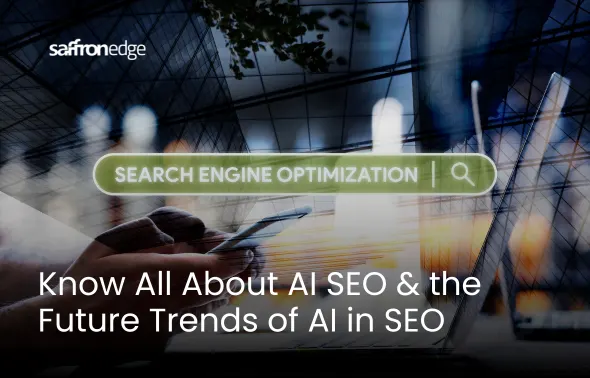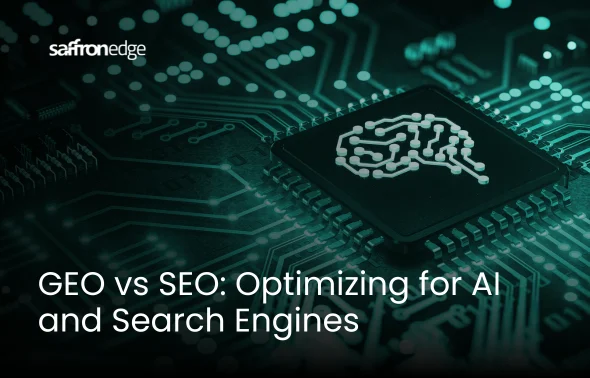Contents
- What is AI SEO?
- Rise of AI-Powered Search
- How SEO is Evolving with AI?
- Importance of AI SEO
- Key Components of AI SEO
- Take Your SEO to the Next Level with AI
- Advantages of Implementing AI SEO
- How to Optimize for AI SEO?
- Risks & Limitations of AI SEO
- Future of AI in SEO
- Conclusion
- Transform Your SEO with AI-Driven Insights
The merger of AI and SEO has already started reshaping how users interact with search engines. From Google’s AI Overviews to platforms like Perplexity and ChatGPT, the way search results appear is shifting fast.
This evolution raises a common question: Is AI killing SEO? The answer lies not in its end but in how AI is transforming SEO into a smarter, intent-driven process.
The answer lies in comprehending how AI is integrated into SEO practices. AI-driven SEO has brought significant changes in the digital marketing industry, helping businesses to stay ahead in the market.
In this blog, you’ll discover how AI is bringing tremendous changes to search engine optimization and providing actionable strategies to stay at the top.
What is AI SEO?
AI SEO (Artificial Intelligence Search Engine Optimization) is the integration of Machine learning, Natural language processing and Large language models into SEO. This approach automates key SEO components.
SEO is the foundation of building a business’s online visibility, where, depending upon the algorithm, search engine preferences change and that’s where AI for SEO enters.
The merger of AI highlights how human adaptability meets machine precision.
In a broader perspective, AI is transforming SEO practices by enabling marketers to analyze a large amount of data in a specified timeline and speed, ensuring accuracy.
Machine learning algorithms help you identify user patterns, behavioural insights and much more, making your work easy.
Thus, this data-driven approach empowers you to make informed decisions with AI for SEO, supported by AI SEO services that offer scalable growth for businesses of all sizes.
Rise of AI-Powered Search
Search engines have constantly evolved, but the introduction of AI has been the biggest shift in how information is discovered.
To understand why AI SEO matters today, let’s look at Google’s journey:
-
2011 – Panda Update: Focused on quality content by penalizing keyword stuffing and thin content.
-
2013 – Hummingbird: Improved understanding of natural language queries, not just keywords.
-
2015 – RankBrain: Google’s first use of machine learning to interpret queries and deliver relevant results.
-
2019 – BERT (Bidirectional Encoder Representations from Transformers): Helped Google understand context and nuance in searches.
-
2021 – MUM (Multitask Unified Model): Allowed Google to analyze information across text, images, and video for complex queries.
-
2023 – SGE (Search Generative Experience): Marked the shift to AI-powered answers that summarize results directly.
-
2024 – GEO (Generative Engine Optimization): The emerging discipline of optimizing for AI-generated results.

Takeaway: The path from keywords → intent → machine learning → generative AI shows that SEO is no longer just about ranking pages. It’s about ensuring your content is AI-readable, context-rich, and trustworthy.
How SEO is Evolving with AI?
The transition from traditional SEO to AI-powered SEO optimization marks a major shift in user interaction and how search engines prioritize content, requiring a modern SEO agency to adapt strategies beyond rankings alone.
1. Intent-Focused Keywords
AI search engines prioritize users' intent to deliver relevant, comprehensive, high-quality content rather than prioritizing those stuffed with keywords and link building.
A strategic approach is vital as algorithms excel at identifying long-tail keywords and more.
Algorithms have started using Natural language processing to understand a user’s search intent for content ranking, resonating with users' queries and answering their questions.
For example, a fitness apparel company optimizes keywords with a focus on users’ search intent, like “best running shoes” or “women's sports shoes,” optimizing their ad content campaigns to resonate with buyers’ interests and preferences.
2. Generative Engine Optimization
This is an extension of traditional SEO focusing on optimizing content to feature in citations and AI generative responses like ChatGPT, Perplexity and Google AI’s overview.
Traditional SEO is focused on ranking your web page in search results, whereas GEO focuses on getting your content visibility in AI-generated answers to help you build authority.
GEO methods focus on incorporating citations and quotations to boost visibility in AI-generative responses.
3. Zero-Click Search
Featured snippets, knowledge panels and AI-generative answers have led to more content visibility, contributing to zero-click searches by answers reflecting on the search results page rather than users having to click on the website.
However, the shift in evaluating success has transformed drastically:
-
The importance of traditional metrics like organic traffic is losing its relevance.
-
Increased prevalence of content quality and authority.
-
Featured snippet optimization is becoming vital.
-
Brand visibility and social media impressions have become prominent.
Informational queries are impacted largely, whereas transactional and branded searches stay relevant.
Importance of AI SEO
SEO strategies in today’s time, if they incorporate AI, stand out in the competitive market:
-
Data processing capabilities have largely improved in terms of analyzing data at a quick pace, ensuring accuracy in detecting points missed in manual analysis.
-
Natural language processing makes it easy for marketers to understand users' intent, helping them optimize content resonating with users' search rather than stuffing it with keywords.
-
Using AI tools upgrades workflow automation, allowing teams to focus on strategy and creative development.
-
Proactive optimization with algorithms adaptive to subtle shifts within hours rather than taking weeks or days.
-
Modern AI SEO tools ensure cross-platform optimization with content changes of all categories, from featured snippets, voice searches, to AI-generated responses.
The gap between traditional SEO and SEO AI is closing with the continuous integration of AI into core algorithms.
Key Components of AI SEO
There are five components of AI SEO that, when combined, create a detailed approach to modern SEO. Each component merges with artificial intelligence to deliver productive results.

1. AI Search Visibility
SEO AI focuses on visibility in AI-powered responses through:
-
Featured Snippets: AI identified all the search queries for featured snippets and patterns that rank in SERP features.
-
Question Format Structure: AI analyzes millions of search queries to identify your niche users' search results and how they phrase their search content.
-
Entity Definition Optimization: AI references your content for a clear definition of entities and included properties.
2. Performance Tracking
Rather than relying on traditional analysis of manual data, AI systems have a different approach, making it easy:
-
Machine-learning algorithms: Deliver automated learning systems for performance establishment across various metrics and detecting deviations, if any.
-
Natural Language alert systems: Detect issues and communicate them in simple language for contextual information about reasons and suggested actions.
3. Technical SEO Enhancements
AI integration enables the identification of website errors and other technical issues through:
-
There are AI systems that recognize faults in patterns of site structure, server response code, and crawl behaviours, highlighting undiscovered issues.
-
AI is capable of estimating traffic and ranking considering technical issues by gauging comparative analysis based on historical data.
-
From identification to automated implementation to fix common technical issues.
-
AI generates appropriate schema markup based on content and type.
-
AI can identify optimal linking opportunities based on content relationships, user patterns, and ranking potential.
4. Content Generation and Optimization
AI tools can help generate and optimize content aligned to users’ search results and SEO guidelines:
-
AI-Generated Content: AI tools are capable of generating text to provide comprehensive content.
-
Extensive Research: AI thoroughly analyzes all top-ranking pages and extracts key points, enabling them to have a good position in content creation.
-
Competitor Analysis: AI tools can identify gaps in competitors' content and suggest unique angles for effective content creation after competitor analysis at scale.
-
Outline Structures: AI tools provide comprehensive topic structures for complete topic coverage.
-
Refining Content: AI rules out top-performing content to extract semantically relevant terms, entities and missing concepts. Content is revised for readability through advanced learning models.
The most efficient output comes from combining AI with human creativity and expertise rather than solely using AI.
5. AI-Driven Keyword Research
AI transforms the traditional process of finding keywords by focusing on predictive analysis, analyzing emerging trends before they appear in conventional keyword tools.
Instead of prioritizing keyword similarity, AI tools focus on intent through semantic clustering. With the components in mind, we proceed to the benefits AI SEO offers.
6. AI-Driven Link Building & Authority
AI tools can analyze authority signals, predict which backlinks will have the highest SEO value, and even flag toxic links for disavowal.
They also recommend outreach opportunities by mapping content themes with high-authority publishers, strengthening domain credibility and E-E-A-T compliance.
Take Your SEO to the Next Level with AI
Harness AI for smarter keyword research, content optimization, and generative search visibility.
Advantages of Implementing AI SEO
Effective implementation of AI SEO provides organizations with several key benefits:
1. Efficiency
AI tools help marketers save time, allowing them to focus on tasks that require manual effort, enabling the team to work on creativity and other strategic initiatives.
2. Accuracy
Guesswork decreases in SEO decision-making through AI’s data-driven insights. AI can highlight which content elements relate to higher ranking in a specific niche through analysis of millions of SERPs in real-time.
3. Big Data Analysis
AI sifts through millions of keyword combinations, identifying top-performing patterns that are impossible to discover in manual data research.
4. Scalability
AI tools enable efficient scaling of SEO efforts across extensive web research and related properties.
They make large-scale operations seamless by generating tailored content briefs through analysis of pages, enabling teams to optimize a large volume of content libraries with speed and consistency.
5. Adaptability
The quick adaptation of AI to algorithm changes enables quick analysis and accurate responses aligned to new trends.
How to Optimize for AI SEO?
Optimizing for AI SEO requires aligning your website with machine learning, natural language processing, and generative search engines like Google AI, ChatGPT, and Perplexity.
1. Prioritize Semantic & Intent-Driven Content
AI search engines no longer rely solely on keywords; they analyze context and intent behind queries. Writing content that satisfies user intent is the foundation of AI SEO.
What to Do:
-
Move away from keyword stuffing and focus on semantic relationships.
-
Answer user intent with comprehensive, conversational explanations that mirror natural language queries.
-
Cover entire topics in depth instead of writing thin, keyword-targeted blogs.
Example: Instead of targeting “SEO AI tools,” create content that answers:
-
“What is an AI SEO tool?”
-
“How do AI SEO tools improve rankings?”
-
“Best AI SEO tools for beginners vs enterprises.”
Think of AI SEO as creating content that speaks to a real human question, not just a string of keywords. Intent-driven, semantic-rich content ensures lasting visibility.
2. Implement Schema Markup
For AI to understand your content, it needs structured signals. Schema markup acts as a translator between your website and search engines.
What to Do:
-
Add structured data (FAQ schema, HowTo schema, Product schema, Local Business schema) to your website.
-
Schema helps AI and search engines understand context beyond keywords.
-
Increases chances of being pulled into featured snippets, AI Overviews, and GEO (Generative Engine Optimization) answers.
Example: A before vs. after scenario of a webpage in Google search results, illustrating the impact of schema markup.

A schema is the blueprint for your content; without it, AI struggles to interpret your pages accurately.
3. Target Conversational & Long-Tail Queries
AI-driven search and voice assistants prioritize conversational, human-like queries. This makes long-tail keywords critical for discoverability.
What to Do:
-
Optimize for voice search and natural queries.
-
Use AI-powered keyword tools to identify question-based and conversational queries.
-
Create FAQ sections within blogs to capture “People Also Ask” and AI-driven answers.
Example: Instead of “running shoes,” optimize for:
-
“What are the best running shoes for flat feet?”
-
“Affordable women’s running shoes under $100.”
Long-tail and conversational queries ensure your brand shows up in voice search, AI overviews, and zero-click results.
4. Combine AI Content with Human E-E-A-T
AI can generate content quickly, but it lacks trust and authority. That’s where human expertise and E-E-A-T (Experience, Expertise, Authority, Trustworthiness) come in.
What to Do:
-
Use AI for content research, clustering, and drafts.
-
Human writers must add expertise, authority, and unique insights.
-
Reference credible sources, cite studies, and add original commentary.
-
This ensures compliance with Google’s E-E-A-T (Experience, Expertise, Authority, Trustworthiness) standards.
Example: An AI draft blog on “AI in healthcare SEO” is reviewed by a healthcare marketer who adds real case studies and compliance guidelines.
The best AI SEO strategies are a blend of machine efficiency and human authenticity.
5. Optimize Multi-Format Content
AI is not limited to text; it reads images, videos, and audio. Optimizing across formats increases your visibility.
What to Do:
-
Ensure all images, videos, infographics, and podcasts have metadata, transcripts, and alt-text.
-
AI interprets visual content via structured labels.
-
Diversify formats to increase visibility in AI-driven results across Google Images, YouTube, and TikTok search.
Example: A product page with a demo video + transcript gets visibility not only on Google but also in AI summaries.
A multi-format strategy future-proofs your content, ensuring AI can find, read, and rank it in multiple ways.
6. Leverage GEO (Generative Engine Optimization)
(GEO) Generative Engine Optimization is the new evolution of SEO, optimizing for AI-generated summaries and answers.
What to Do:
-
Adapt your content to appear in AI-generated summaries.
-
Use clear citations, concise definitions, and quotable sentences.
-
Structure blog content into question-answer formats.
Example: A finance blog writes “What is compound interest?” in a concise definition box → increases chances of being cited in Google AI Overview.

GEO ensures your content isn’t just ranked on Google, but also referenced in AI-driven answers, giving you authority and visibility.
7. Strengthen Internal Linking & Topical Authority
AI algorithms rank sites that demonstrate deep topical expertise. Internal linking and content hubs build this authority.
What to Do:
-
Build content hubs around a primary topic with supporting subpages.
-
Use AI-powered keyword clustering tools (like MarketMuse, Surfer) to identify topic clusters.
-
Link related blogs and service pages to improve semantic connections.
Example:
-
Hub Page: AI in SEO
-
Supporting Pages: AI SEO Tools, GEO Optimization, Risks of AI SEO, AI in Local SEO.
Internal linking turns your website into a semantic knowledge network that AI trusts to deliver comprehensive answers.
8. Monitor & Adapt with AI SEO Tools
AI SEO is dynamic; rankings and AI overview citations shift constantly. Tracking them requires AI-powered tools.
What to Do:
-
Use AI SEO platforms like SurferSEO, Clearscope, SEMrush, or Ahrefs with AI features.
-
Continuously track changes in rankings, AI overview mentions, featured snippets, and zero-click searches.
-
Adapt content dynamically based on real-time AI-driven analytics.
Example: A blog sees a drop in GEO citations → AI audit recommends rephrasing answers into shorter quotable sentences.
The brands that win in AI SEO are the ones that monitor, test, and adapt in real-time using AI-driven insights.
Risks & Limitations of AI SEO

While AI SEO offers tremendous advantages, it also comes with challenges businesses must navigate:
-
Content Duplication: Over-reliance on AI-generated content can lead to repetition, hurting originality and ranking.
-
E-E-A-T Concerns: Google prioritizes content created with experience, expertise, authority, and trust. AI content without human review risks losing credibility.
-
Algorithm Uncertainty: AI systems adapt fast, but they also depend on evolving algorithms that can shift ranking dynamics overnight.
-
Lack of Human Context: AI lacks creativity, empathy, and cultural nuances that only human SEO experts can provide.
-
Over-Automation Risks: Too much automation may overlook brand tone, ethical boundaries, or compliance factors.
Balancing AI precision with human creativity is key to sustainable SEO strategies.
Future of AI in SEO
The influence of AI in SEO brings significant transformations to the digital industry, reshaping the business world through the following evolving trends:
1. Voice Search Optimization
Content optimization is required considering the increase in voice search queries, which are longer, conversational and structured as questions.
These highlight the importance of adaptation to SEO strategies like AI-powered Natural Language Processing for question-based content and direct answers.
2. AI-Powered Personalized Search Experiences
AI gauges user preferences, patterns and behaviour in real-time, tailoring search results and pop-ups streamlined to their search experiences in recommendations to drive customer engagement and conversion rates.
3. Image and Video SEO
AI-powered searches enable the images and videos to display on the search results if optimized with the relevant metatags and data for discoverability in search engines.
It allows the algorithm to see and interpret the content and context of images.
4. High-Intent Recognition
AI is excelling at understanding what users want rather than just focusing on what users are asking.
It highlights the content that covers the entire customer, from what to why the users are asking.
Conclusion
With the transformation brought by AI in SEO, aspects for ranking on SERPs and visibility across the web have increased for businesses worldwide. The implementation of AI SEO brings varied perks for enterprises striving to scale in the digital market.
Thus, following the above information will help you integrate AI into SEO practices in a productive manner, delivering actionable strategies to stay ahead of the competition.
Transform Your SEO with AI-Driven Insights
Let our team implement AI strategies to save time, increase authority, and drive measurable growth.
Rank in AI Overviews
Frequently Asked Questions
How to optimize for AI search?
Integrating GEO (Generative Engine Optimization) into your SEO enhances your online visibility. AI SEO eliminates manual tasks focused on optimizing generative engines to phrase content for schema markup and concise answers.
Why AI SEO matters?
AI and SEO go hand-in-hand as integration of AI in SEO provides a competitive advantage in the digital market to brands and businesses, helping them scale online with natural language processing, algorithm adaptation, workflow automation and data processing.
How to optimize for AI SEO?
Optimization for AI SEO is done by prioritizing semantic content, implementing schema markup, long-tail keywords, conversational queries, first-party with expert-level content, creating multi-format content, optimizing GEO and internal link building for relationships and authority.
What are some tools and technologies in AI SEO?
There are various tools to optimize AI SEO strategies through content creation platforms, SEO audit tools, keyword intelligence platforms, AI overview and chatbots optimization.
What is the future of AI in SEO?
By implementing AI in SEO strategies, you’ll be able to improve your visibility in both traditional and AI-powered search results. Eventually, driving relevant traffic and engagement to your website. AI SEO combines traditional SEO practices with artificial intelligence, which means merging human creativity and expertise with machine learning.
Related Blogs
We explore and publish the latest & most underrated content before it becomes a trend.

Subscribe to Saffron Edge Newsletter!

Rank in AI Overviews








